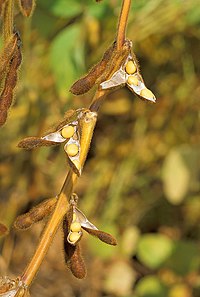
Photo from wikipedia
To produce high quality, glyphosate-resistant soybeans, we crossed Jinda 73 and glyphosate-resistant RR1 (Roundup Ready First Generation) (RR1) resulting in 34 hybrid strains. To determine the effects of glyphosate on… Click to show full abstract
To produce high quality, glyphosate-resistant soybeans, we crossed Jinda 73 and glyphosate-resistant RR1 (Roundup Ready First Generation) (RR1) resulting in 34 hybrid strains. To determine the effects of glyphosate on soybean metabolism, we grew the two parents upto the seedling stage, and measured chlorophyll, soluble sugar, malondialdehyde (MDA), relative conductivity and proline. Then, we treated the plants with glyphosate and measured the same factors again. Results showed that the chlorophyll content of Jinda 73 and RR1 decreased after spraying glyphosate. Glyphosate increased the level of soluble sugar, MDA, relative conductivity and proline in Jinda 73, but had no significant effect on RR1. We determined glyphosate resistance of the parents and the 34 hybrid, offspring strains by documenting the growth response in the field after treatment with glyphosate. Results showed that 29 hybrid, offspring strains have complete glyphosate resistance. Polymerase chain reaction (PCR) shows that the strains which have complete resistance to glyphosate have imported the CP4 5-enolpyhruvylshikimate-3- phosphate synthase (CP4 EPSPS) gene successfully. We selected three high quality, glyphosate-resistant strains (F7-3, F7-16 and F7-21), which had higher protein and oil levels as compared with Jinda 73.
Journal Title: Physiology and Molecular Biology of Plants
Year Published: 2018
Link to full text (if available)
Share on Social Media: Sign Up to like & get
recommendations!